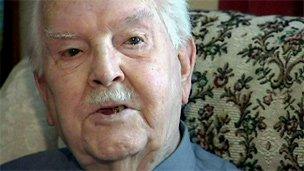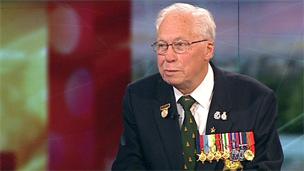Veterans recall WWII's South-East Asian campaign
- Published
As services are held to mark the 65th anniversary of Victory over Japan Day, British veterans remember World War II's South-East Asian operations.
Arthur Lane

Mr Lane says World War II's South-East Asian campaign has often been overlooked
Arthur Lane was only a teenager when he and 80,000 other Allied troops were taken prisoner by the Japanese army in Singapore in 1942.
He spent the next four-and-a-half years as a prisoner of war, witnessing and surviving the horrors of the Japanese prison camps in which thousands of his fellow British and Commonwealth soldiers died.
As services are held to mark the 65th anniversary of Victory over Japan Day (VJ Day), Mr Lane hopes World War II's South-East Asian campaign will now get the same recognition as the better-known operations in Europe.
"Finally people are beginning to release there was another war on. It is never mentioned, it is all about Europe, everything Europe, France, Belgium, D-Day landings," he says.
"No-one mentions the wars in the Far East, where approximately 4.5 million solders died, and that was just servicemen, and possibly about nine to 10 million civilians died."
Remembering the fall of Singapore, Mr Lane said he was forced to witness five of his fellow servicemen being executed.
"My job was then to sound the Last Post, what good could it do?"
Roy Miller
Roy Miller, who served with the Royal Navy in South-East Asia from 1944, said VJ Day was always very emotional.

Mr Miller says his experiences make him think of today's troops in Afghanistan
"It was an arduous campaign and it should be remembered for ever more," he says.
Mr Miller was a gunner on aircraft carrier HMS Indomitable, helping to see off a number of kamikaze attacks by Japanese planes.
"Kamikaze aircraft, we were warned about then, we were told we had to shoot them down or we'd lose the ship," he says.
"We were attacked three or four times but we managed to fight them off, I believe we shot them down."
Mr Miller added that his experience of World War II made him think of the British troops currently in Afghanistan and their families.
"When you look at the families that are constantly being devastated [by deaths in Afghanistan] and compare those with the families that were devastated with the loss of life in the Second World War, it is same, except the numbers are different," he says.
John Maurice Wilson
Now 94, John Maurice Wilson from Lancashire remembers clearly the three-and-a-half years that he spent as a prisoner of war.
"I often wonder if living so long has been retribution for having seen so many 18-year-olds die horrible deaths", he says.
Mr Wilson was taken prisoner in Singapore and was forced to work in "absolutely horrific" conditions on the Burma-Thailand railway, where "people were dying from malnutrition and tropical diseases".
Along with another 300 British prisoners, he was then forced to work in a copper mine in a remote area of northern Honshu, Japan.
"On the 15 August 1945 we were marched into the village to hear Eisenhower on the radio telling us we were free," he recalls.
Despite the "bullying and ill treatment" suffered at the hand of the guards, John says that before leaving, the prisoners "gave a concert and invited the Japanese miners and their families".
The next day, he recalls how "the whole village turned out to wave us goodbye with Union Jacks which the local seamstress had made".
- Published15 August 2010